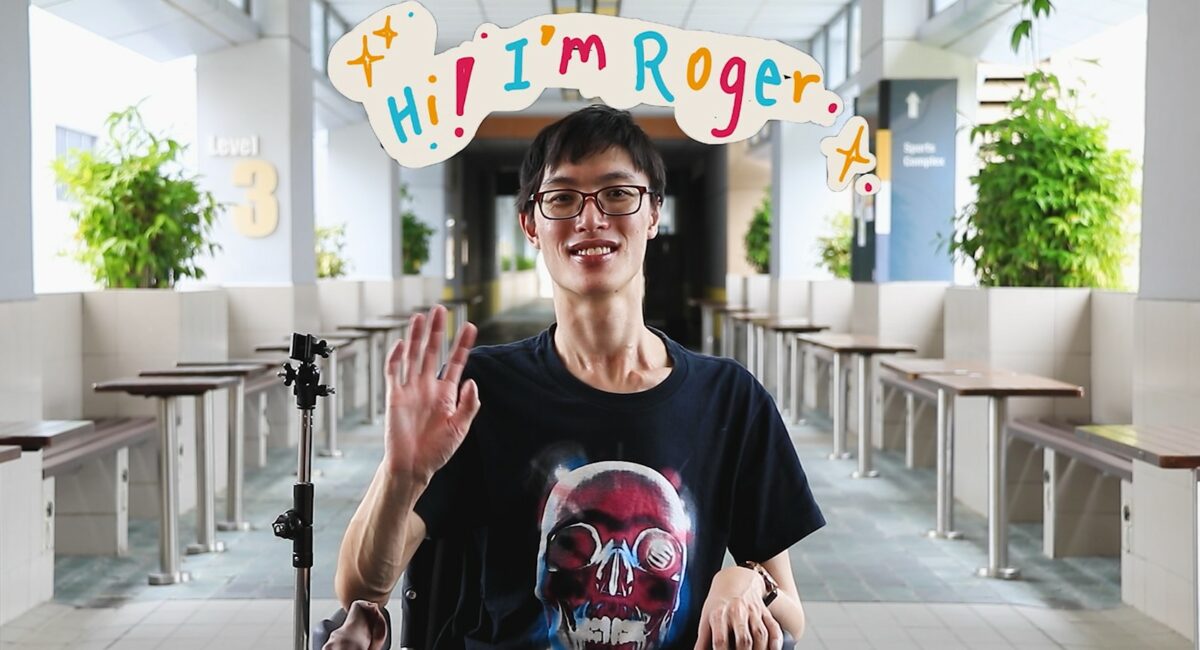When Roger Lua was in his 20s, he had already experienced more storms than most of his peers. The chirpy young man had a stroke due to his congenital heart condition when he was just 20 years old.
Since then, the effects of the stroke left him with weakness on the left side of his body, requiring him to use a motorised wheelchair to move around.
His cognitive functioning in the areas of memory, planning and executive functioning were also affected, thereby impacting his job sustainability in open employment.
Spurred by a strong desire to be a contributing member of society and to support his family’s finances, Roger, 33, enrolled in SPD’s Employment Support Programme (ESP) in 2019.
Job Placement and Job Support
An assessment was first conducted by the ESP team to determine Roger’s needs and job readiness. Besides the support rendered to him by the ESP team, Roger also proactively sought out job opportunities. He eventually secured a full-time job as an Executive at Republic Polytechnic’s Office of Student Support.
To help identify potential job accommodations needed, his occupational therapist Triona Ni Dhomhnaill analysed his job scope and work demands. The team also actively followed up with him upon his work commencement.
“When Roger first started work, he reported having difficulty in remembering things that were assigned to him,” shared senior employment support specialist Yvonne Tan.
This is when the ESP team came in to recommend cognitive strategies, with advice from the occupational therapist, to help Roger cope with his work at the early stages of his job. The team also advised him on the relevant funds that he can tap on for the maintenance and repair of his motorised wheelchair so that he can travel independently to work.
Having a supportive workplace ecosystem is another imperative component to enable persons with disabilities to thrive at work. With colleagues who believe in the value of inclusion and actively work with our ESP team to support Roger certainly make the assimilation process easier and more welcoming.
Triona recalled that the support rendered by the RP team was excellent.
“They identified a gap in Roger’s knowledge in using Microsoft Excel. With their timely feedback, we were able to recommend him training by our trainer to enhance his work skills,” said Triona.
The ESP team also worked with Roger’s work buddy so that he could support Roger in achieving his tasks.
Roger’s social worker Goh Kee Choon credits the RP team for their support in helping Roger navigate his work life smoothly: “His colleagues have been very accommodating and we have worked well together to support Roger and helping him to stay in the job.”
Making the Workplace More Accessible
Conducting workplace assessment is also part of the process done by our ESP team to ensure that the worksite is accessible.
When Roger shared that the door to a nearby washroom was heavy and its lock was difficult to handle for a wheelchair user, Triona dropped by to assess the site. As a result of the site visit and recommendations, the school accepted SPD’s recommendation to install an automatic door in the washroom.
Grateful for the help that he received in his employment journey, Roger said: “SPD has helped me a lot in terms of my job security and career growth. Thank you for helping me not to look down on myself even if I’m a person with disability. I was also given a new job scope recently and I’m grateful to my reporting officer for entrusting me with more responsibilities. My sincere appreciation to my employer RP for giving me the opportunity to gain financial independence and pursue a career that is meaningful and fulfilling.”
Encouraging More to Embrace Inclusive Hiring
Roger has since been working at RP for about 2.5 years, where he enjoys helping students with their queries at the Office of Student Support.

Being able to be meaningfully engaged at work motivates Roger and he hopes that more jobseekers with disabilities get to be offered the same shot at being contributing members of society.
“I would like to encourage employers to be more open, patient and try to accommodate the needs that persons with disabilities (PwDs) have. When hiring or working with PwDs, don’t just look at their disability but also look at their strengths. If given a chance, we can still complete a task like people without a disability,” he said.
Echoing Roger’s views, Kee Choon said: “With the support and understanding from employers, PwDs can show that they are capable and can contribute as a valuable member in the team too.”
“For the PwDs, acceptance of themselves and being confident will help them to gel with their colleagues and be more successful in the workplace,” he added.
Photo Credit: Roger Lua





